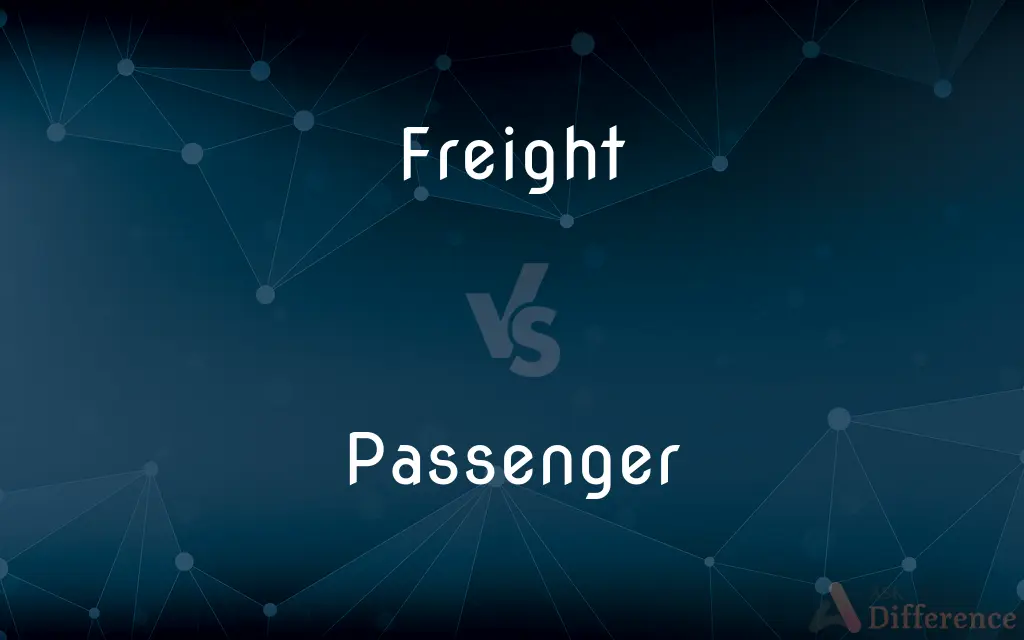Freight vs. Passenger — What's the Difference?
Edited by Tayyaba Rehman — By Urooj Arif — Updated on April 16, 2024
Freight involves the transportation of goods, while passenger refers to the transportation of people.

Difference Between Freight and Passenger
Table of Contents
ADVERTISEMENT
Key Differences
Freight transport is primarily concerned with the movement of goods and materials, often across long distances, utilizing various modes such as trucks, trains, ships, and planes. Passenger transport, on the other hand, focuses on moving people, providing services like buses, trains, airplanes, and ferries.
In terms of infrastructure, freight operations might require specialized facilities such as cargo terminals, warehouses, and heavy load-handling equipment, whereas passenger services need passenger terminals, lounges, and amenities designed for comfort and safety.
The regulatory environment for freight can be complex, involving customs, trade regulations, and cargo security measures. Passenger transport, in contrast, is heavily regulated with a focus on safety, scheduling, and passenger rights.
Freight services are critical for the economy, impacting industries and supply chains, while passenger services are essential for mobility, impacting daily commuting and travel.
From a business perspective, freight charges are usually based on the type, weight, and volume of goods transported, along with the distance. Passenger fares, however, are generally fixed based on the route and class of service, with variations for peak and off-peak times.
ADVERTISEMENT
Comparison Chart
Primary Focus
Goods and materials
People
Facility Requirements
Cargo terminals, warehouses
Passenger terminals, lounges
Regulatory Focus
Customs, trade, cargo security
Safety, scheduling, passenger rights
Economic Impact
Essential for industry and commerce
Essential for mobility and travel
Pricing Factors
Type, weight, volume of goods, distance
Route, service class, time of travel
Compare with Definitions
Freight
Goods transported in bulk by truck, train, ship, or aircraft.
The company shipped freight across the country by rail.
Passenger
A person who travels in a vehicle but does not operate it.
The train was filled with passengers during the morning commute.
Freight
The system or process of transporting goods.
The logistics company optimized its freight operations.
Passenger
Pertaining to vehicles or services designed for transport of people.
Passenger safety is a top priority for airlines.
Freight
Pertaining to or used in the conveyance of goods.
They discussed freight rates with the shipping company.
Passenger
A ticket-holder traveling in a public or private conveyance.
Every passenger must have a valid ticket.
Freight
A charge paid for carriage or transportation of goods.
The freight costs were calculated based on the shipment weight.
Passenger
Relating to services provided for those who travel.
Passenger terminals are equipped with various amenities.
Freight
Transported by means of a larger vehicle or vessel.
Freight trucks are commonly used for interstate deliveries.
Passenger
Someone who travels by means of public or private transport.
She prefers being a passenger rather than driving.
Freight
Goods transported in bulk by truck, train, ship, or aircraft
A decline in the amount of freight carried by rail
Passenger
A passenger (also abbreviated as pax) is a person who travels in a vehicle but bears little or no responsibility for the tasks required for that vehicle to arrive at its destination or otherwise operate the vehicle. The vehicles may be bicycles, buses, passenger trains, airliners, ships, ferryboats, and other methods of transportation.
Freight
A freight train
I can hear the regular wail of the twelve o'clock freight from my house
Passenger
A person who travels in a conveyance, such as a car or train, without participating in its operation.
Freight
A load or burden
These warm winds deposit their freight of moisture in showers of rain
Passenger
(Informal) A person who participates only passively in an activity.
Freight
Transport (goods) in bulk by truck, train, ship, or aircraft
The metals had been freighted from the city
Passenger
(Archaic) A wayfarer or traveler.
Freight
Be laden or burdened with
Each word was freighted with anger
Passenger
One who rides or travels in a vehicle, but who does not operate it and is not a member of the crew.
Freight
Goods carried by a vessel or vehicle, especially by a commercial carrier; cargo.
Passenger
Somebody in a team who does not do their fair share of the work.
Freight
A burden; a load.
Passenger
(falconry) A young hunting bird that can fly and is taken while it is still in its first year.
Freight
Commercial transportation of goods.
Passenger
(obsolete) A migratory bird, a bird of passage.
Freight
The charge for transporting goods. Also called freightage.
Passenger
(obsolete) A passer-by; a wayfarer.
Freight
A railway train carrying goods only.
Passenger
(obsolete) A ship carrying passengers, a ferryboat.
Freight
To convey commercially as cargo.
Passenger
A moth, Dysgonia algira
Freight
To load with goods to be transported.
Passenger
(military) Any of the individual warheads of a MIRV missile.
Freight
To imbue with a specified element or elements
Freighted her words with innuendo.
Passenger
(intransitive) To ride as a passenger in a vehicle.
Freight
(uncountable) The transportation of goods (originally by water; now also by land); also, the hiring of a vehicle or vessel for such transportation.
Passenger
A passer or passer-by; a wayfarer.
Freight
(uncountable) Goods or items in transport; cargo, luggage.
The freight shifted and the trailer turned over on the highway.
Passenger
A traveler by some established conveyance, as a coach, steamboat, railroad train, etc.
Freight
(countable) Payment for transportation.
The freight was more expensive for cars than for coal.
Passenger
A traveler riding in a vehicle (a boat or bus or car or plane or train etc) who is not operating it
Freight
(figuratively)
Freight
(countable) A burden, a load.
Freight
Cultural or emotional associations.
Freight
(transitive)
Freight
To load (a vehicle or vessel) with freight (cargo); also, to hire or rent out (a vehicle or vessel) to carry cargo or passengers.
Freight
To transport (goods).
Freight
(by extension) To load or store (goods, etc.).
Freight
(figuratively) To carry (something) as if it is a burden or load.
Freight
Chiefly followed by up: to carry as part of a cargo.
Freight
(obsolete) Freighted; laden.
Freight
That with which anything is fraught or laden for transportation; lading; cargo, especially of a ship, or a car on a railroad, etc.; as, a freight of cotton; a full freight.
Freight
The sum paid by a party hiring a ship or part of a ship for the use of what is thus hired.
Freight
Freight transportation, or freight line.
Freight
Employed in the transportation of freight; having to do with freight; as, a freight car.
Freight
To load with goods, as a ship, or vehicle of any kind, for transporting them from one place to another; to furnish with freight; as, to freight a ship; to freight a car.
Freight
Goods carried by a large vehicle
Freight
Transporting goods commercially at rates cheaper than express rates
Freight
The charge for transporting something by common carrier;
We pay the freight
The freight rate is usually cheaper
Freight
Transport commercially as cargo
Freight
Load with goods for transportation
Common Curiosities
How do freight costs differ from passenger fares?
Freight costs are typically based on the weight, volume, and type of goods, while passenger fares are based on the route and class of service.
What is the primary purpose of freight transport?
The primary purpose of freight transport is to move goods and materials from one location to another.
What facilities are unique to passenger transport?
Facilities unique to passenger transport include lounges, waiting areas, and ticketing counters.
What are the main types of freight transport?
The main types include road freight, rail freight, air freight, and sea freight.
What is a passenger in the context of transportation?
A passenger is someone who travels in a vehicle but does not operate or control it.
How do passenger services enhance travel experience?
Passenger services enhance travel by providing amenities, safety features, and efficient scheduling.
What regulations affect freight transport?
Regulations affecting freight transport include those related to trade, customs, and cargo security.
What safety measures are important for passenger transport?
Safety measures for passenger transport include regular vehicle maintenance, emergency protocols, and staff training.
How does freight transport impact the economy?
Freight transport is crucial for supply chain operations and impacts various industries by facilitating trade.
Can freight and passenger services be combined in one vehicle?
Yes, some vehicles, like certain trains, can carry both freight and passengers, though this is less common.
Share Your Discovery

Previous Comparison
Proprietary vs. Nonproprietary
Next Comparison
Six vs. NineAuthor Spotlight
Written by
Urooj ArifUrooj is a skilled content writer at Ask Difference, known for her exceptional ability to simplify complex topics into engaging and informative content. With a passion for research and a flair for clear, concise writing, she consistently delivers articles that resonate with our diverse audience.
Edited by
Tayyaba RehmanTayyaba Rehman is a distinguished writer, currently serving as a primary contributor to askdifference.com. As a researcher in semantics and etymology, Tayyaba's passion for the complexity of languages and their distinctions has found a perfect home on the platform. Tayyaba delves into the intricacies of language, distinguishing between commonly confused words and phrases, thereby providing clarity for readers worldwide.













































